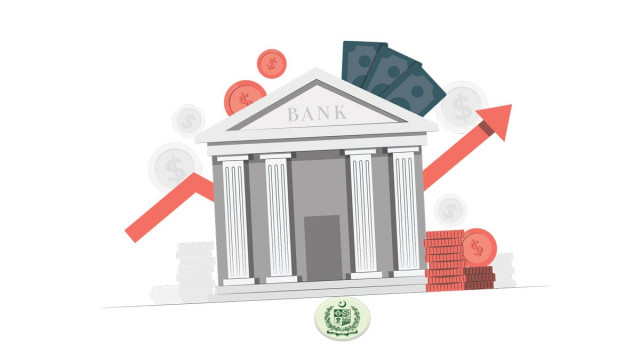Banking lobby overpowers finance ministry
Decision to impose taxes on banks involved in currency manipulation still pending

For over three months, the Ministry of Finance has been sitting on the central bank’s inspection report against commercial banks in a foreign currency manipulation case, delaying action against them despite clear incidences of charging ‘higher spreads.’
The action against at least eight commercial banks has been put on hold despite Finance Minister Ishaq Dar’s repeated vows to impose heavy taxes on the commercial banks for reportedly making exorbitant profits, taking Rs25 billion to Rs50 billion, by playing with the value of the rupee against the US dollar.
“The SBP has conducted a limited scope inspection of the matter and furnished its report to the Finance Division on December 27, 2022,” the central bank informed the Senate Standing Committee on Finance on Wednesday.
The date of submission of the report underscores that the federal government and central bank were deliberately delaying action against the banks. The federal government had an opportunity last month to slap additional taxes, through a mini-budget that it has been claiming to impose, in lieu of fines.
Nevertheless, the State Bank of Pakistan (SBP)’s written reply to the committee gives the impression that the central bank was not in the mood to take any early decisive action against the commercial banks despite determining that they were over-charging.
“It was observed that the overall increase in foreign exchange (FX) income of the banks was mainly driven by higher spreads due to heightened volatility, however, in some cases, the banks charged higher spreads,” according to the SBP’s brief.
SBP’s Executive Director, Arshad Mahmood Bhatti, stated in the meeting that there was a shortage of dollars and importers were chasing the limited availability but “banks went beyond logical spread”.
Neither the SBP representative nor the Additional Secretary of Finance, Amjad Mehmood, gave a firm date for taking punitive action against the banks.
“SBP was in the process of imposing monetary penalties on the banks. However, the enforcement action was put on hold because of our understanding that the federal government was considering using a fiscal option with regard to high FX earnings of the banks,” according to the SBP’s written statement in the committee.
The central bank further stated that on March 21, the SBP sought clarity from the Ministry of Finance related to the government’s stance on the use of the fiscal option.
The finance ministry officials have been repeatedly saying that in order to recover around Rs37 billion in taxes, the government wanted to impose up to 41% additional income tax on the quantum of money that the banks made on FX income.
“If the government does not intend to proceed with the fiscal option, SBP will initiate enforcement action in accordance with its supervisory framework,” according to the SBP.
It added, however, that “Although the bank’s gross foreign exchange income increased significantly in the first half of 2022 as compared to the first half of 2021, allocation of the additional income to various components of foreign exchange business is quite difficult due to complexities involved in their calculations and record keeping.”
The SBP said that the banks record income from various components, like interbank transactions, transactions with customers, and FX derivative transactions under a single head of “FX Income” in their financial statements.
As such, it is difficult to ascertain the portion of FX income attributable to customer’s transactions alone, according to the central bank.
Further, the “FX income” is a gross income head, which does not include allied administrative, operating expenses and tax-related expenses, stated the SBP.
In September last year, the deputy governor of SBP had told the Senate Standing Committee on Finance that show-cause notices had been served to the National Bank of Pakistan, Allied Bank Limited, Bank Al Habib, Standard Chartered Bank, Meezan Bank, Habib Bank Limited, HabibMetro Bank and the United Bank Limited.
The allegation was that these banks quoted higher dollar rates to importers on some of the transactions and made substantial profits, according to the deputy governor. The banks quoted very high rates on some of the transactions, which created more volatility and uncertainty.
The hearing took place the day Pakistan’s rupee further shed its value to nearly Rs284 to a dollar on Wednesday.
The Additional Secretary of Finance, Amjad Mehmood said that the federal government was taking a cautious approach because any action will have an impact on the banking industry.
According to the SBP, the heightened volatility, uncertainty, short foreign exchange liquidity and short net open foreign exchange positions of the banks were the main reasons behind charging higher spreads during the May to August 2022 period.
To ensure that the banks follow a reasonable and transparent approach in pricing their transactions and to improve the market conduct in future, SBP held meetings with the banks and warned them about their practices and advised them to rationalise the spreads being charged to the customers, said SBP in a statement.
Published in The Express Tribune, March 30th, 2023.
Like Business on Facebook, follow @TribuneBiz on Twitter to stay informed and join in the conversation.



















COMMENTS
Comments are moderated and generally will be posted if they are on-topic and not abusive.
For more information, please see our Comments FAQ